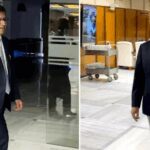Unlock the Editor’s Digest for free
Roula Khalaf, Editor of the FT, selects her favourite stories in this weekly newsletter.
Investigators in Taiwan have detained former presidential candidate Ko Wen-je, the second prominent politician to be hit with a corruption probe since President Lai Ching-te took office in May.
The Taipei District Court on Thursday ordered Ko’s detention, declaring “serious suspicion” that he was guilty of profiteering under the anti-corruption law by allowing a mall to be built larger than legal limits when he was mayor of Taipei three years ago.
The detention of Ko, a 65-year-old former trauma surgeon who gained 26 per cent of the vote in Taiwan’s presidential election in January, follows charges filed last month against Cheng Wen-tsan, one of the most influential politicians in the ruling Democratic Progressive party.
Cheng, a former vice-premier who until recently chaired a semi-official body for exchanges with China, is accused of corruption during an earlier mayoral term. Cheng and Ko have denied any wrongdoing.
The high-profile investigations have rekindled debate in Taiwan over widespread corruption surrounding development projects and public procurement, as well as the independence of the judiciary. Taiwan slid last year in Transparency International’s global corruption perceptions index to 28, from 25 a year earlier, and its score dropped slightly for the first time since Lai’s DPP predecessor Tsai Ing-wen took office in 2016.
Opposition accusations of DPP officials abusing their positions and engaging in corruption contributed to Lai receiving the lowest winning vote share in 24 years in a three-way presidential race. The DPP also lost its parliamentary majority.
Since Lai took office, the opposition-dominated legislature has hobbled his administration by voting to expand its own powers, a move the constitutional court is reviewing on the president’s request.
Prosecutors’ swift moves against Cheng and Ko have prompted Taiwanese commentators to question whether Lai was “cleaning house” of political rivals or pushing an anti-corruption crackdown to win back public support. Ko’s Taiwan People’s party had garnered support mainly from disaffected young voters and focused on fighting corruption as a main plank of its platform.
Lai Shyh-bao, a lawmaker with the opposition Kuomintang, suggested after Cheng’s indictment that part of the president’s motivation was “probably to make the public feel his determination in fighting corruption, to lift poll ratings and at the same time divert attention from the current chaos in domestic politics”.
A prosecutor and an official at the Judicial Yuan, the constitutional branch overseeing the courts, said investigators typically sounded out their superiors before proceeding with big cases, especially those involving vested interests or politicians.
“In a case like this, a signal would have been given from above before they go and detain him,” the prosecutor said.
Cheng has been accused of allegedly taking NT$5mn (US$156,000) in bribes for redesignating land use titles to facilitate an industrial development project in Taoyuan, where he was mayor until 2022.
Ko’s administration had approved the Core Pacific City mall to be built with a floor area 8.4 times the size of the underlying land plot as an urban renewal incentive. The court argued Ko “clearly understood” this was in violation of the law.
Lai told a local television channel last week that he was determined to push for clean politics. While insisting on the judiciary’s independence, he said: “I can of course not take a stance on any individual case. But I can report to the people one principle: regardless of parties or political camps, regardless of who is involved, as long as there are legal violations, I encourage investigators and prosecutors to investigate and handle it according to the law.
“The people yearn for good governance,” Lai added.





